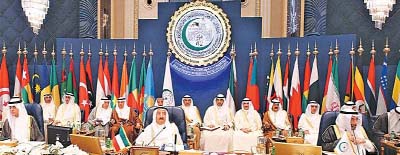
Agencies, Kuwait :
Kuwait’s emir, speaking days after an attack claimed by the self-styled Islamic State (IS) killed 21 people in Saudi Arabia, said on Wednesday sectarian strife was the most serious threat facing Muslims and called for immediate action to tackle it.
Speaking at the opening session of a meeting of foreign ministers of the Organisation of Islamic Cooperation (OIC), Sheikh Sabah al-Ahmed al-Sabah said Muslim countries must work together to confront terrorism.
“We must take a serious stand on the sectarian malady that has been shaking the structure of our nation and fragments it,” the emir told foreign ministers and representatives from the 57-member OIC at its annual meeting.
Iran ready for talks aimed at resolving region’s conflicts, says minister
“This fanaticism is the most dangerous to the existence of our nation … We are all losers in this conflict, and the winner is the one who wants to inflame this destructive strife for their own objectives ….”
He called for better cooperation between countries so that terrorist organisations like the IS could be dealt with effectively. “We are required to intensify efforts with the world to combat terrorism being waged by terrorist organisations.”
Saudi Foreign Minister Adel al-Jubeir echoed Sheikh Sabah’s call.
“We are all eager to confront the threats that face the Islamic nation, foremost among them the phenomenon of terrorism, violence, extremism and sectarianism, which have wrought deep damage in the Islamic nation,” he said.
Iran, Turkey and Pakistan are among countries attending the conference, which is expected to see the OIC approve an “effective strategy to combat terrorism, violent extremism and Islamophobia,” the organisation said.
The strategy, expected to be approved later, would focus on Islamic world responses to the root causes of terrorism, including poverty, underdevelopment, unresolved conflicts and sectarianism, the OIC said in a statement.
Pakistan was represented at the conference by the Prime Minister’s Adviser on Foreign Affairs and National Security, Sartaj Aziz.
Sheikh Sabah defended the Saudi-led air strikes against Yemen’s Houthi rebels and their allies after they “threatened our security and stability and captured power by force”.
He also urged Iran to cooperate with the international community to resolve the dispute over its nuclear programme and to respond to efforts by countries in the region to establish closer ties. In a letter published in Kuwaiti newspapers, Iranian Foreign Minister Mohammad Javad Zarif, who is also attending the meeting, said his country was prepared to engage in dialogue in order to resolve the region’s several conflicts.
Kuwait’s emir, speaking days after an attack claimed by the self-styled Islamic State (IS) killed 21 people in Saudi Arabia, said on Wednesday sectarian strife was the most serious threat facing Muslims and called for immediate action to tackle it.
Speaking at the opening session of a meeting of foreign ministers of the Organisation of Islamic Cooperation (OIC), Sheikh Sabah al-Ahmed al-Sabah said Muslim countries must work together to confront terrorism.
“We must take a serious stand on the sectarian malady that has been shaking the structure of our nation and fragments it,” the emir told foreign ministers and representatives from the 57-member OIC at its annual meeting.
Iran ready for talks aimed at resolving region’s conflicts, says minister
“This fanaticism is the most dangerous to the existence of our nation … We are all losers in this conflict, and the winner is the one who wants to inflame this destructive strife for their own objectives ….”
He called for better cooperation between countries so that terrorist organisations like the IS could be dealt with effectively. “We are required to intensify efforts with the world to combat terrorism being waged by terrorist organisations.”
Saudi Foreign Minister Adel al-Jubeir echoed Sheikh Sabah’s call.
“We are all eager to confront the threats that face the Islamic nation, foremost among them the phenomenon of terrorism, violence, extremism and sectarianism, which have wrought deep damage in the Islamic nation,” he said.
Iran, Turkey and Pakistan are among countries attending the conference, which is expected to see the OIC approve an “effective strategy to combat terrorism, violent extremism and Islamophobia,” the organisation said.
The strategy, expected to be approved later, would focus on Islamic world responses to the root causes of terrorism, including poverty, underdevelopment, unresolved conflicts and sectarianism, the OIC said in a statement.
Pakistan was represented at the conference by the Prime Minister’s Adviser on Foreign Affairs and National Security, Sartaj Aziz.
Sheikh Sabah defended the Saudi-led air strikes against Yemen’s Houthi rebels and their allies after they “threatened our security and stability and captured power by force”.
He also urged Iran to cooperate with the international community to resolve the dispute over its nuclear programme and to respond to efforts by countries in the region to establish closer ties. In a letter published in Kuwaiti newspapers, Iranian Foreign Minister Mohammad Javad Zarif, who is also attending the meeting, said his country was prepared to engage in dialogue in order to resolve the region’s several conflicts.

